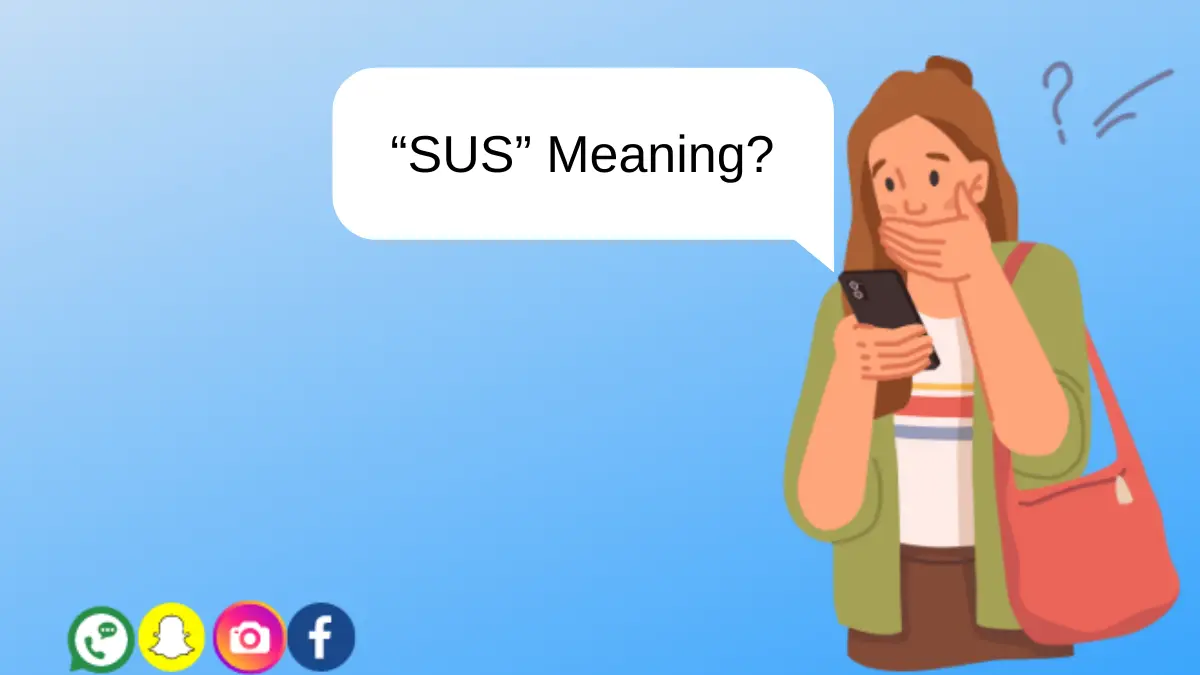In the ever-evolving landscape of internet slang, few terms have gained as much traction as sus. This seemingly simple abbreviation has taken the online world by storm, becoming a staple in digital conversations, particularly among Gen Z users. But what exactly does sus mean, and how did it become such a ubiquitous part of our online lexicon?

Sus” has emerged as one of the most popular slang terms in recent years, permeating social media platforms, online gaming communities, and even everyday conversations. This short but impactful word has become a go-to expression for Gen Z and beyond, used to describe anything or anyone that seems suspicious or questionable.
| Aspect | Description | Popularity Source |
|---|---|---|
| Meaning | Abbreviation of “suspicious” | Internet slang, gaming |
| Origin | Early internet forums, gaming communities | Online communication |
| Popularization | “Among Us” game | Gaming, streaming platforms |
| Usage | Expressing doubt, suspicion, or questioning authenticity | Social media, everyday conversation |
| Cultural Impact | Memes, viral content, mainstream media references | Internet culture, pop culture |
| Variations | “Sussy,” regional adaptations | Meme culture, local slang |
The rise of “sus” in online conversations is a testament to the rapid evolution of language in the digital age. Its widespread adoption reflects the need for quick, expressive communication in fast-paced online environments, where brevity often trumps formality. Much like other popular internet slang terms such as GYAT or WTW, “sus” has quickly become an essential part of online communication.
Origin and Etymology of “Sus”
At its core, “sus” is simply an abbreviation of the word “suspicious.” This shortening follows a common pattern in internet slang, where longer words are truncated for ease and speed of communication. The term “sus” has been around in various forms of slang for decades, with its usage documented in urban dictionaries as far back as the early 2000s.
However, the journey of “sus” from niche internet slang to mainstream adoption is a fascinating one. Initially, it was primarily used in online forums and chat rooms, often in gaming contexts or discussions about potentially untrustworthy behavior. Its concise nature made it perfect for quick typing in fast-paced online interactions, similar to how OMM is used for emphasis.
The Role of “Among Us” in Popularizing “Sus”
While “sus” had been simmering in the background of internet culture for years, it was the explosive popularity of the online multiplayer game “Among Us” that catapulted the term into the mainstream. Released in 2018 but gaining massive popularity in 2020, “Among Us” revolves around identifying an “impostor” among a crew of spaceship workers.
The game’s mechanics of deception and discovery made “sus” the perfect shorthand for players to quickly communicate their suspicions about other players. As “Among Us” streams and memes flooded social media platforms, “sus” rode the wave of the game’s virality, becoming a recognizable term even for those who had never played the game.
This phenomenon highlights the significant impact that gaming communities can have on language trends and meme culture. The rapid spread of “sus” from a game-specific term to a widely understood piece of internet slang demonstrates the power of online gaming in shaping digital communication norms.
Modern Usage and Examples of “Sus”

Today, “sus” has transcended its gaming origins and found its way into everyday language and social media discourse. Its versatility allows it to be used in a variety of contexts, from playful banter to genuine expressions of doubt or suspicion.
On social media platforms like TikTok and Instagram, “sus” is frequently used in captions, comments, and even hashtags. For example:
- “That discount seems too good to be true. #sus”
- “My friend’s excuse for canceling plans is kinda sus.”
- “The way that character acted in the last episode? Totally sus!”
The term has also spawned numerous memes and viral trends, further cementing its place in internet culture. These memes often play on the idea of suspicious behavior or unexpected twists, using “sus” as a punchline or reaction.
Related Slang Terms and Synonyms
While “sus” has carved out its own unique space in modern slang, it’s part of a broader family of terms used to express skepticism or doubt. Some related terms include:
- Sketchy: Often used to describe situations or people that seem unreliable or potentially dangerous.
- Shady: Similar to sketchy, but with more emphasis on secretive or dishonest behavior.
- Dubious: A more formal synonym, often used in academic or professional contexts.
Regional variations of “sus” exist as well. In some parts of the UK, for instance, “dodge” or “dodgy” might be used in similar contexts. In Spanish-speaking online communities, “sospechoso” (suspicious) is sometimes shortened to “sospe,” mirroring the abbreviation trend.
Psychological Perspective on Using “Sus”
The popularity of “sus” reflects broader societal trends towards skepticism and wariness, particularly in online interactions. In an era of misinformation and digital deception, labeling something as “sus” can be a quick way to express doubt or encourage critical thinking.
From a psychological standpoint, the frequent use of “sus” might indicate a heightened state of alertness in digital spaces. It’s a linguistic tool that allows users to quickly flag potential threats or inconsistencies, serving as a sort of social alarm system.
However, the casual use of “sus” can also point to underlying trust issues in online communities. The ease with which something can be labeled as suspicious might reflect a broader cultural trend toward distrust, especially among younger generations who have grown up navigating the complexities of online interactions.
Cultural Impact and Influence on Internet Culture
“Sus” has become more than just a word; it’s a cultural phenomenon that has left its mark on internet culture. Its integration into memes, videos, and digital conversations has made it a recognizable part of online discourse across various platforms.
The term has even made its way into mainstream media, with references appearing in TV shows, movies, and news articles discussing internet culture. Influencers and celebrities have adopted the term, further amplifying its reach and cementing its place in pop culture.
This widespread adoption demonstrates how internet slang can shape broader cultural conversations and bridge generational gaps in communication. “Sus” has become a shorthand way to engage with themes of trust, skepticism, and social dynamics in the digital age.

The Evolution of “Sus” in Online Gaming
While “Among Us” played a crucial role in popularizing “sus,” the term has continued to evolve within gaming communities. It’s now commonly used across various multiplayer games, especially those involving strategy, deception, or team-based gameplay.
On streaming platforms like Twitch, “sus” has become part of the standard vocabulary for both streamers and viewers. It’s used not just to describe in-game behavior, but also to comment on unexpected events or questionable strategies.
The term has also inspired variations in gamer lingo, such as “sussy” (an adjective form) or “sussing out” (the act of investigating suspicious behavior). These adaptations show how flexible and dynamic gaming language can be, constantly evolving to meet the communicative needs of players.
Common Misinterpretations and Variations
As with any popular slang term, “sus” has been subject to misinterpretations and variations. Some users, particularly those less familiar with internet culture, might misuse the term or apply it too broadly, diluting its original meaning.
One common variation that has emerged is “sussy,” often used as an adjective or to add a playful tone. For example, “That’s sussy behavior” or “You’re acting kinda sussy.” This variation has gained particular traction among younger users and in meme culture.
Regional differences in usage have also emerged. In some areas, “sus” has taken on additional connotations beyond just suspicion, sometimes being used to imply something is strange or off-putting in general. These subtle shifts in meaning demonstrate how slang evolves as it spreads across different communities and contexts.

The Future of “Sus” in Slang
Predicting the longevity of slang terms is notoriously difficult, but “sus” shows signs of having staying power. Its versatility and broad applicability suggest it may continue to be relevant in online discourse for some time.
However, like all slang, “sus” may eventually face competition from newer terms or evolve in meaning. Comparing it to past slang trends, we can see patterns of how some terms become integrated into standard language while others fade into obscurity.
The future of “sus” likely depends on its continued relevance in gaming and meme culture, as well as its ability to adapt to new contexts and uses. As long as there’s a need for a quick, expressive way to convey suspicion or doubt in digital communication, “sus” may continue to thrive.
Conclusion
The journey of “sus” from a simple abbreviation to a cultural phenomenon encapsulates the dynamic nature of language in the digital age. Its rapid rise and widespread adoption reflect the power of internet culture, gaming communities, and social media in shaping modern communication.
As a slang term, “sus” represents more than just a trendy way to say “suspicious.” It embodies the skepticism and quick-witted nature of online interactions, serving as a linguistic tool for navigating the complexities of digital social dynamics.
The evolution and spread of “sus” also highlight broader trends in digital communication and language evolution. It demonstrates how quickly language can adapt to new technologies and social contexts, and how online communities can drive linguistic innovation.
In the end, whether “sus” remains a permanent fixture in our lexicon or eventually fades into internet history, its impact on digital communication and internet culture is undeniable. It stands as a testament to the creativity and adaptability of language users in the fast-paced world of online interaction.
For more insights into modern slang and internet language, check out our articles on IKYFL and ND, which offer similar deep dives into popular online expressions.







